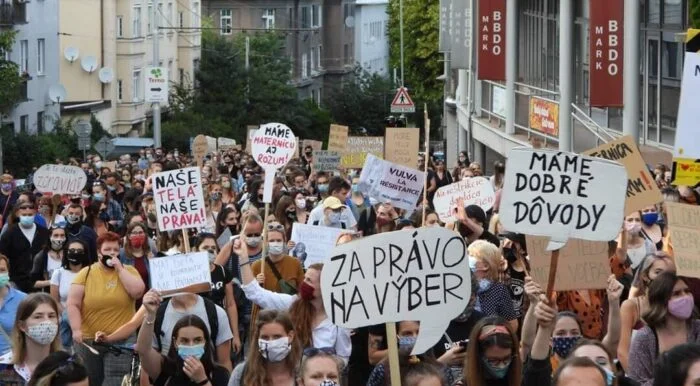FATIGUE Seminar Series
Populism, Gender and Sexuality in Central and Eastern Europe
Tuesday, 17 November 2020, 17:00 GMT
In recent years a number of populist and increasingly authoritarian governments in Central and Eastern Europe have employed anti-gender discourse, characterised by opposition to reproductive rights, access to abortion, LGBTQ rights, sexual education or legal tools for eliminating violence against women. This has resulted in a marked rise in homophobic and anti-feminist attitudes and behaviours in societies across the region as well as a significant increase in LGBTQ and women’s protests and feminist mobilisations. The aim of this seminar is to present cutting-edge research on gender and sexuality in the context of populist politics by three Early Stage Researchers from the Marie Skłodowska-Curie Innovative Training Network on ‘Delayed Transformational Fatigue in Central & Eastern Europe: Responding to the Rise of Illiberalism/Populism’ (FATIGUE).

To register for the seminar, please go to: https://ucl.zoom.us/meeting/register/tJ0pdOusrz0uHN1Txxp-Zi2JfRSp_p1Xc3zT
Carolin Heilig (UCL): Civil society in a pillarised society: First insights from civil society mobilised around gender in Kraków
Gender constitutes a core battlefield of Polish populist politics and is affected in two ways. Firstly, gender is used by the right-wing government and its media and civil society allies to construct the ‘pure Polish people’, justifying marginalisation and backlash against LGBTQ and women’s rights. Secondly, the rise of illiberal politics in Poland undermining the rule of law and the protection of minorities changed the environment in which civil society actors that push back operate. These developments exemplify and amplify the phenomenon of the polarisation and pillarisation of Polish society. Drawing on Ekiert’s concept of ‘pillarised society’, this paper explores how this plays out in the field, using insights from fieldwork in Kraków (2019-2020) and a survey of civil society actors in the city. This paper aims to contribute to our understanding of the role of civil society in the processes of democratic erosion in Poland.
Carolin Heilig is a FATIGUE Early Stage Researcher and a PhD candidate at UCL SSEES. She researches the intersection of civil society with political parties in Central and Eastern Europe, with a special focus on Poland. She spent the 2019-20 academic year at Jagiellonian University in Kraków. She holds a BA in Political Science and Slavic Studies and an MSc in Russian and East European Studies.
Slobodanka Dekic (University in Belgrade): Politics or Policies? Confronting anti-gender narratives on family and gender by LGBT organisations in Serbia, Bosnia and Herzegovina and Croatia
The activities and transnational networks of anti-gender movements and their insistence on the dangers of ‘gender ideology’ for the preservation of the traditional family and the ‘natural’ understanding of men and women have been thoroughly documented by academics. The focus of my presentation is on the counter-narratives, usually framed through the term ‘progressive forces’. In the context of three post-Yugoslav states, I analyse advocacy and lobbying activities of local LGBT organisations related to the legalisation of same-sex partnerships and examine how family politics is understood by local LGBT activists. The aim of the research is to examine the potential (and readiness) of local LGBT organisations to offer a significant challenge to dominant narratives on the traditional family, framed in the line with the populist, anti-gender understandings of the term.
Slobodanka Dekic is a FATIGUE Early Stage Researcher and PhD candidate at the Sociology Department at the Faculty of Philosophy, University in Belgrade. She was active in several LGBT and peace-building organisations and initiatives in Bosnia and Herzegovina and Serbia, and worked in Mediacentar Sarajevo on programs related to media, education and human rights.
Mina P. Baginova (Charles University, Prague): Post-1989 Social Movements in East Central Europe: Activist Cultures of Contemporary Feminist Movements and Women’s Mobilisations in Poland and Slovakia
Based on my ethnographic fieldwork with contemporary feminist activist cultures in Poland and Slovakia, where the dialectical relationship between the progressive movements, anti-gender groups and the state are particularly urgent, my research explores the reflections on following questions: What are the feminist activist cultures in CEE today? How do the contemporary feminist movements react to the emergence of anti-gendered politics? How do the emergence of anti-gender movements and anti-gender discourse of the populist right politics challenge the feminist movements in their strategy building towards systematic change in Poland and Slovakia and in the CEE region at large?
Mina P. Baginova is a FATIGUE Early Stage Researcher and a PhD candidate at Charles University in Prague. Her project, rooted in the ethnographic approach, explores the contemporary feminist movements and activist cultures in East Central Europe. Her previous work includes research in Chile, Colombia, Peru and Bolivia as well as Greece and Turkey. She is the programme lead at the Applied Anthropology Network (EASA), Mobilising the Planet 2020.